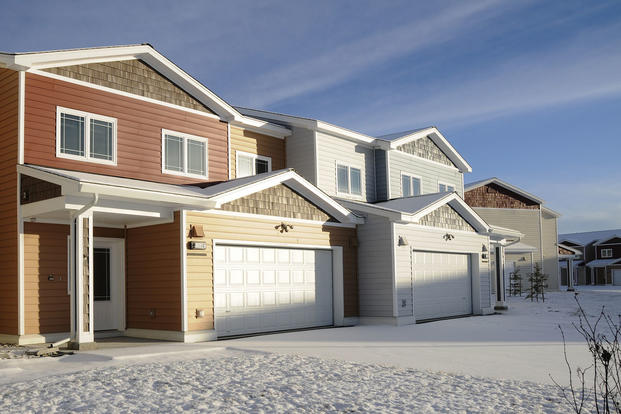When your PCS orders come through and you begin the process of house hunting, you may consider living on base. The quality of military housing — as part of the military quality of life — is a key component of military readiness. And military installations try offer accommodations to ensure that families want for nothing. But, living on a military base may not be the right living situation for every military family. Here's a short list of pros and cons to living on a military base for you and your family to consider:
Pros to Living on Base:
Quality Military Housing
Quality housing helps the Department of Defense (DoD) retain the best personnel for its all-volunteer military force. The proportion of personnel remaining in service from bases with high-quality housing is about 15 percent higher than for those stationed at places with low-quality housing. Today's servicemembers want to live in a community that offers stability and continuity as a backdrop for deployment, reassignment, and day-to-day life.
Basic Allowance for Housing
Servicemembers living on or off base in private-sector/community housing, or in "military privatized housing," are entitled to a basic allowance for housing (BAH). BAH provides military families accurate and equitable housing compensation based on housing costs in local civilian housing markets. BAH is a critical ingredient that provides the income stream to support initial and long-term financial viability and security.
A Welcoming Military Community
When you move to your new military installation, you'll have a tight-knit military community ready to welcome you and your family with open arms. You may not have as much privacy as you wish, with your spouse's CO and company members living next door or right around the corner. However, you'll have spouses nearby who are ready to help you get settled into your new environment.
DoD Offers Housing when Private Sector Can Not
DoD provides military housing in areas where private-sector housing falls short — considering cost, commuting area, and other established criteria. In these cases, it operates barracks for unaccompanied personnel, military family housing for members with dependents, and temporary lodging for military families who are changing stations or on temporary duty.
Cons to Living on Base:
Unaccompanied Housing Quarters
Single junior-enlisted servicemembers are required to live in barracks, where they share a room with at least one other person and with a communal bathroom and a telephone down the hall. About half a million single servicemembers live in these quarters, which are often substandard, inadequately maintained, or obsolete.
The Base Realignment and Closure Commission (BRAC)
BRAC is an initiative that closes certain military bases that are deemed no longer necessary. And, as a result, many military families will have to relocate to other military bases. The latest round of BRAC closures in 2005, displaced a significant amount of military families, who were then relocated to other installations based on the military's need.
Some Military Housing Not Up to Snuff
Some government-owned military housing can be dilapidated, too small, lacking in modern amenities or are substandard. In fact, some military housing has not been updated in three decades, and 43 percent (or 58,000 housing units) are substandard, according to the Office of the Deputy Under Secretary of Defense Installation Environment website.
If you're still unsure of where you want your military family to live when you get your PCS orders, you should consult your on-base financial counselor at your old and new duty station. And, don't be afraid to ask other military families living on base or around it what they think of living on an installation. This can help you make a more informed decision when it's time to relocate.
To get more tips or information on easing your PCS, visit Military.com’s PCS/Home Buying Guide.













